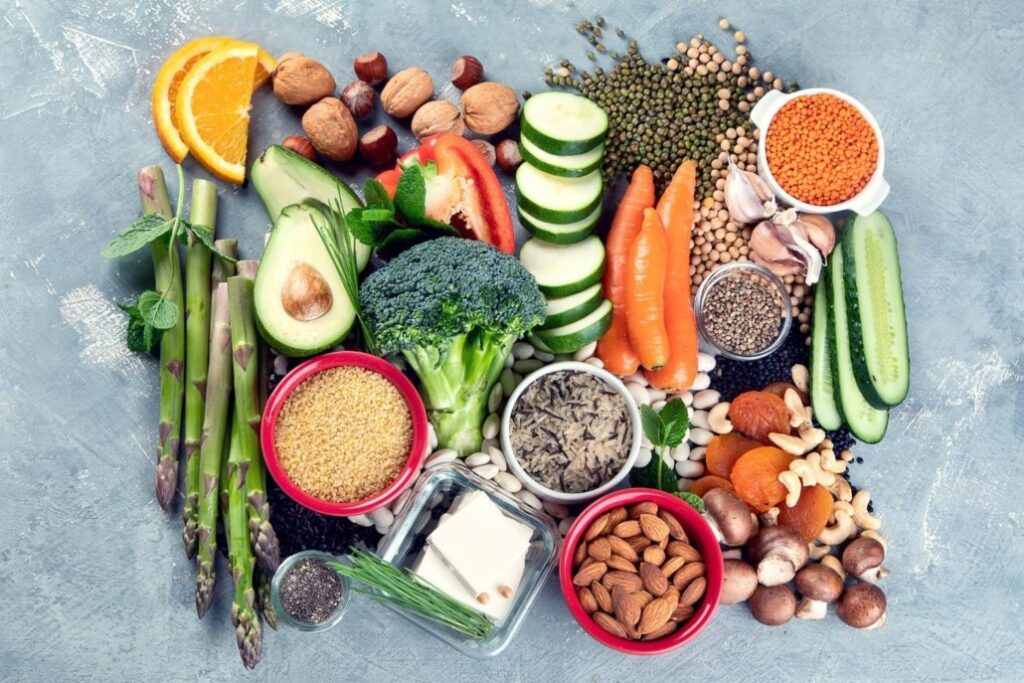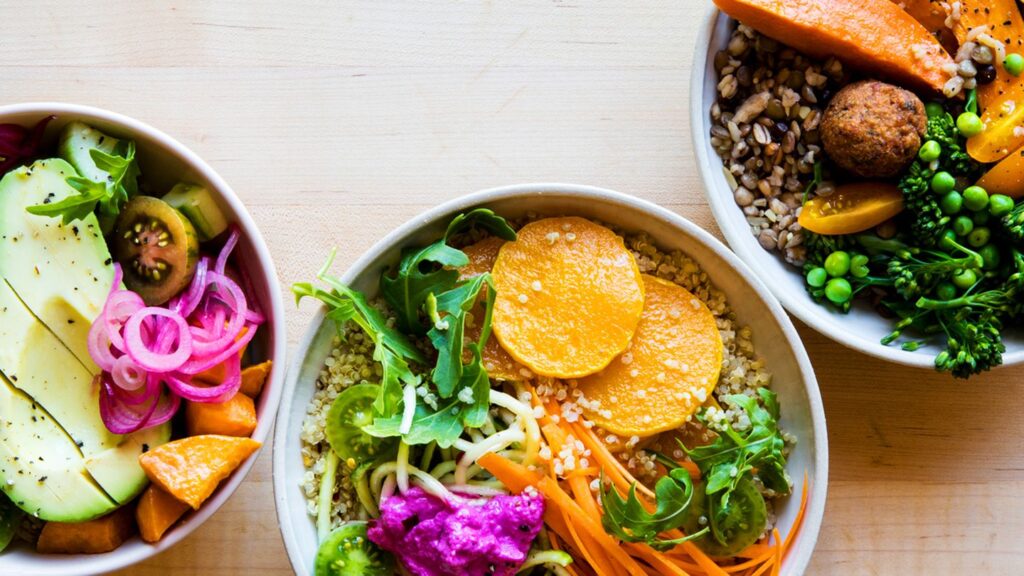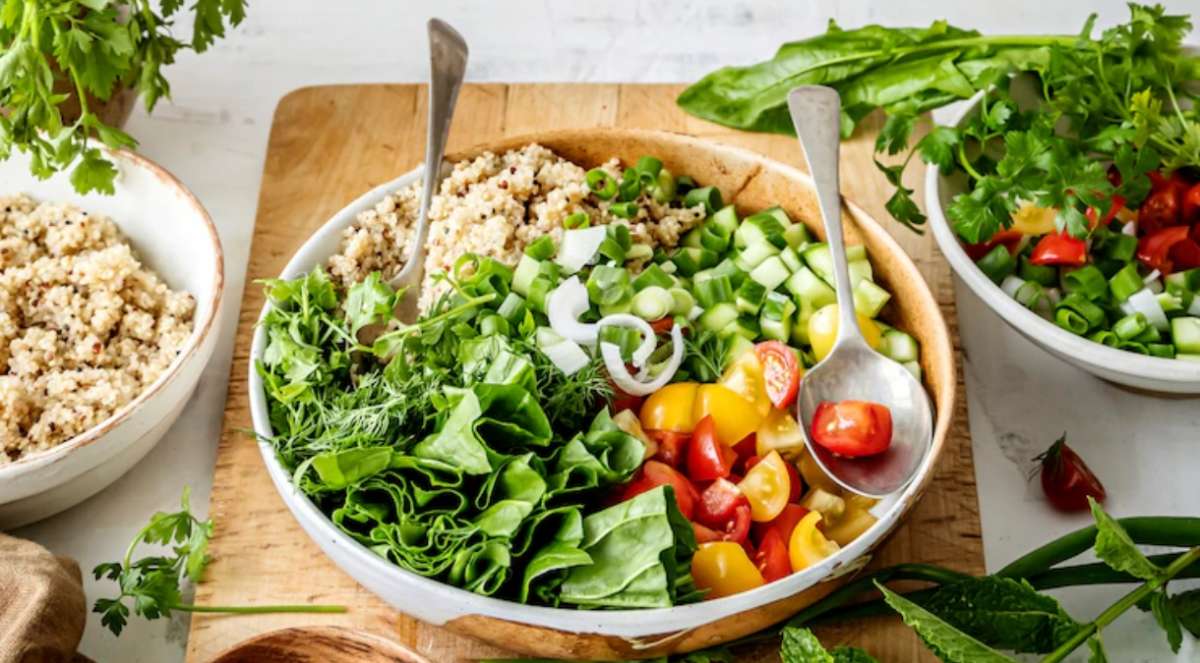A plant-based diet is a diet that primarily consists of whole, unrefined, and minimally processed plant foods, including fruits, vegetables, whole grains, legumes, nuts, and seeds. It is becoming increasingly popular as people become more aware of the health benefits and the impact of animal agriculture on the environment.
Adopting a plant-based diet may lead to lower risk of chronic diseases such as heart disease, diabetes and cancer. Studies have shown that plant-based diets are associated with lower cholesterol levels, lower blood pressure, and lower risk of heart disease. They have also been linked to a lower risk of type 2 diabetes, and some types of cancer.

It may also help with weight management, and has been linked to a lower risk of obesity. Plant-based diets tend to be higher in fiber and lower in calories, which can lead to feelings of fullness and reduced calorie intake. Additionally, plant-based diets may also have a positive effect on gut health, by promoting the growth of beneficial bacteria.
A well-planned plant-based diet can provide all the necessary nutrients for a healthy lifestyle. However, it is important to be mindful of nutrient deficiencies that are more common on a plant-based diet, such as iron, calcium, Vitamin B12, and Omega-3 fatty acids, and find alternative sources or consider taking supplements. With careful planning, a plant-based diet can be a healthy and sustainable way of eating.
It’s worth mentioning that a plant-based diet doesn’t necessarily mean vegan, some people may include eggs, dairy, or fish in their diet, it’s all about the prominence of plants in the diet.
Key Nutrients of a Plant-based diet and their sources

- Protein: Protein is an essential nutrient that plays a vital role in the growth and repair of body tissues, and is necessary for the production of hormones and enzymes. Plant-based diet sources of protein include lentils, beans, peas, nuts, and seeds. Legumes such as lentils, chickpeas and beans are particularly rich in protein and also provide important nutrients such as fiber, iron, and zinc. Nuts and seeds are also great sources of protein and healthy fats.
- Iron: Iron is a mineral that is necessary for the production of hemoglobin, a protein in red blood cells that carries oxygen throughout the body. Iron deficiency can lead to anemia, which can cause fatigue, weakness, and other symptoms. Leafy greens such as spinach and kale, as well as legumes and fortified cereals, are good sources of iron for those following a plant-based diet.
- Calcium: Calcium is a mineral that is necessary for the development and maintenance of strong bones and teeth. It is also important for muscle function and nerve transmission. Calcium can be found in leafy greens, fortified plant milks, and tofu made with calcium sulfate. For example, kale and broccoli are particularly rich in calcium, while fortified plant milks such as soy, almond, and oat milk, can provide similar amounts of calcium as cow’s milk.
- Vitamin B12: Vitamin B12 is mainly found in animal products, but can also be obtained from fortified foods such as plant-based milk and nutritional yeast. Vitamin B12 is important for the proper formation of red blood cells and the proper functioning of the nervous system.
- Omega-3 fatty acids: Omega-3 fatty acids are important for maintaining heart health, brain function, and overall health. They can be found in flaxseeds, chia seeds, and walnuts.
Tips for getting the right nutrients

- Plan your meals: Make sure you include a variety of nutrient-dense foods in your meals to ensure you’re getting all the necessary nutrients. For example, you can have a combination of legumes and whole grains for a complete source of protein. And leafy greens with fortified plant-based milk for a source of calcium and Vitamin D.
- Use fortified foods: Many plant-based alternatives to animal products, such as plant-based milk and meat alternatives, are fortified with nutrients such as calcium, vitamin B12, and iron.
- Take supplements: If you’re concerned about getting enough of a certain nutrient, talk to your doctor about taking a supplement. Vitamin B12 and Omega-3 fatty acids supplements are commonly recommended for people on a plant-based diet.
Advantages of having a Plant-based diet
There are many advantages to having a plant-based diet, some of the key benefits include:
- Improved overall health: Plant-based diets are high in nutrients and low in saturated fat and cholesterol, which can lead to a lower risk of chronic diseases such as heart disease, type 2 diabetes, and certain types of cancer.
- Weight management: Plant-based diets tend to be higher in fiber and lower in calories, which can lead to feelings of fullness and reduced calorie intake. This can help with weight management and maintaining a healthy weight.
- Environmental sustainability: Plant-based diets require fewer resources to produce compared to diets that include a lot of animal products. Animal agriculture is a major contributor to greenhouse gas emissions and deforestation, by reducing or eliminating animal products from your diet, you can reduce your carbon footprint and contribute to a more sustainable planet.
- Animal welfare: Adopting a plant-based diet can also help reduce the demand for animal products, which in turn can help reduce the suffering of animals raised for food.
- Variety and deliciousness: Plant-based diets offer a wide variety of foods to choose from, and many plant-based dishes are delicious and easy to make. From a plate of steamed broccoli to a lentil curry, or a bowl of quinoa and black beans, the options are endless.
It’s important to note that a plant-based diet can be healthy and nutritious if properly planned, but just like any other diet, it’s important to ensure that you are getting the right balance of nutrients and enough calories to meet your needs. Consulting a healthcare professional or a registered dietitian may be helpful.
Disadvantages of having a Plant-based diet

While a well-planned plant-based diet can provide all the necessary nutrients for a healthy lifestyle, there are some potential disadvantages to consider:
- Nutrient deficiencies: Some nutrient deficiencies may be more common in plant-based diets, such as iron, calcium, Vitamin B12 and omega-3 fatty acids. It’s important to be aware of these deficiencies and make sure to find alternative sources of these nutrients or consider taking supplements.
- Limited food options: For some people, a plant-based diet may mean giving up some of their favorite foods that are primarily made of animal products. It may also be more difficult to find suitable options when eating out at restaurants or when traveling.
- Social pressure: A plant-based diet may not be as accepted by some family members, friends, or communities and may cause social pressure or isolation.
- Cost: Some plant-based alternatives to animal products such as meat alternatives or fortified foods can be more expensive than their non-plant-based counterparts.
- Planning and preparation: A plant-based diet requires more planning and preparation than a diet that includes a lot of animal products. It may take more time to learn about alternative sources of nutrients and how to prepare them.
It’s important to keep in mind that a plant-based diet doesn’t necessarily mean vegan and that some people may include eggs, dairy, or fish in their diet. And also, everyone has different needs and preferences, and it’s important to consult with a healthcare professional or a registered dietitian to find the diet that works best for you.
Tasty Plant-based Diet options

- Roasted vegetables: Roasting vegetables such as broccoli, cauliflower, Brussels sprouts, and bell peppers is a simple and delicious way to enjoy them. Add some olive oil, salt, and pepper before roasting for extra flavor.
- Black bean tacos: Black beans are a great source of plant-based protein, and make for a tasty filling in tacos. Top with avocado, salsa, and cilantro for a satisfying and budget-friendly meal.
- Chickpea and spinach curry: Chickpeas are a great source of plant-based protein and iron, and make for a delicious curry when combined with spinach and spices. Serve over rice or with naan bread.
- Quinoa and black bean bowl: Quinoa is a nutrient-dense grain that is high in protein and makes for a great base for a bowl. Top with black beans, avocado, salsa, and cilantro for a satisfying and budget-friendly meal.
- Lentil and sweet potato curry: Lentils and sweet potatoes make for a hearty and flavorful curry. Serve with rice or naan bread.
- Spaghetti and marinara: Whole wheat spaghetti with marinara sauce is a budget-friendly and delicious plant-based meal.
- Stuffed bell peppers: Bell peppers can be stuffed with a variety of plant-based fillings such as quinoa, black beans, and vegetables for a tasty and budget-friendly meal.
- Vegetable stir fry: A quick and easy way to enjoy a variety of vegetables is to stir fry them with your favorite sauce and serve over rice or quinoa.
- Falafel wrap: Falafel is a great plant-based protein source and makes for a tasty wrap when combined with lettuce, tomato, and tahini sauce.
- Smoothie bowl: Smoothie bowls are a great way to pack in a variety of fruits and vegetables in a delicious and convenient way. Add in some spinach, kale, or berries for added nutrition.
In conclusion, a plant-based diet can provide all the necessary nutrients for a healthy lifestyle, and it has many benefits such as lower risk of chronic diseases, weight management, and environmental sustainability. However, it’s important to be mindful of nutrient deficiencies that are more common on a plant-based diet, such as iron, calcium, Vitamin B12, and Omega-3 fatty acids, and find alternative sources or consider taking supplements. With careful planning, a plant-based diet can be a healthy, delicious, and sustainable way of eating.
Furthermore, many plant-based options are budget-friendly, making it accessible for everyone. There are many delicious and easy to make plant-based recipes that can be enjoyed by the whole family, and with a little bit of creativity, a plant-based diet can be a tasty and satisfying experience. It’s important to consult with a healthcare professional or a registered dietitian to ensure that a plant-based diet is the right fit for you and to help you find the right balance of nutrients and enough calories to meet your needs.
